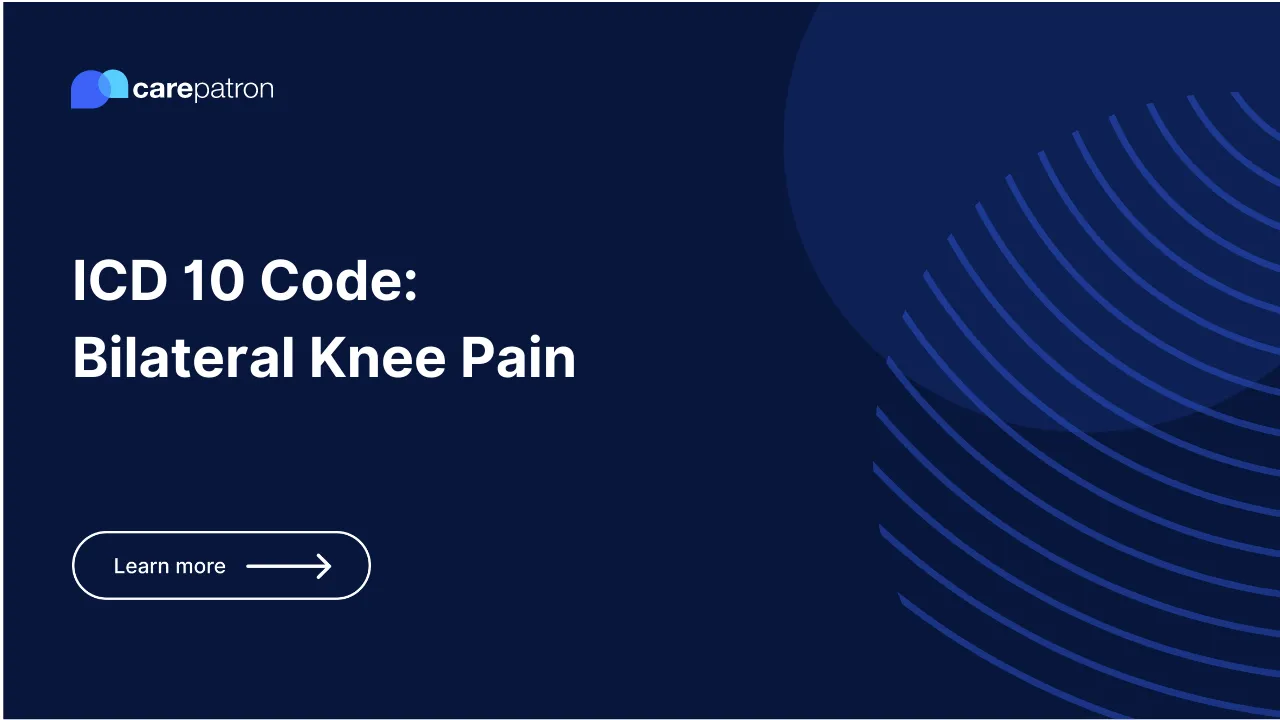DJD Knee ICD-10-CM Codes
Here are commonly used ICD-10 Codes for DJD Knee (Degenerative Joint Disease), including clinical descriptions, billability status, synonyms, FAQs, & more.

What ICD-10 Codes are Used for DJD Knee
Degenerative Joint Disease (DJD), commonly known as osteoarthritis, affects the knee joint, leading to pain and reduced mobility. Below are commonly used DJD Knee ICD Codes:
M17.0
This code is utilized when diagnosing primary degenerative joint disease (DJD) affecting one knee. The direct nature suggests that the condition is primarily related to the natural aging process, where the knee joint undergoes wear and tear over time, resulting in osteoarthritis.
M17.1 - no
This code is applied when DJD in one knee is not primarily due to aging but has a specific cause, such as a previous traumatic injury or infection. It indicates that the osteoarthritis is secondary to a distinct underlying condition or event.
M17.2
This code is used when DJD in one knee can be directly attributed to a past traumatic injury to that knee. Trauma, such as fractures or significant joint dislocations, can lead to long-term joint degeneration and osteoarthritis.
M17.3 - no
This code is employed in cases where osteoarthritis in one knee is secondary but not related to trauma. Secondary osteoarthritis can result from various factors, such as metabolic or systemic conditions.
M17.4
This code is assigned when DJD affects both knee joints and is primarily related to aging. Bilateral primary osteoarthritis acknowledges that both knees are involved due to natural joint wear and tear.
M17.5
This code is applicable when both knees exhibit secondary DJD due to a specific cause. This cause could be an underlying condition, prior trauma, or another triggering factor affecting both knee joints.
Which DJD Knee ICD codes are Billable:
Here's a breakdown of the commonly used codes and their billability status:
- M17.0 - Yes
- M17.1 - No
- M17.2 - Yes
- M17.3 - No
- M17.4 - Yes
- M17.5 - Yes
Clinical Information
- DJD, also known as osteoarthritis, is a degenerative joint condition that affects the knee, mainly the knee cartilage.
- DJD of the knee is characterized by pain, stiffness, and reduced joint mobility, often worsening with activity and improving with rest.
- Over time, DJD leads to joint changes, including the breakdown of cartilage, bone spurs (osteophytes), and inflammation of the synovium.
- Aging, joint overuse, genetics, past injuries, and obesity are common risk factors for developing DJD of the knee.
- Diagnosis typically involves a physical examination, X-rays, and sometimes additional imaging studies like MRI or CT scans.
- Management options for DJD of the knee include:
Medications: Pain relievers and anti-inflammatory drugs.
Physical Therapy: Exercises to strengthen muscles and improve joint function.
Lifestyle Modifications: Weight management and joint protection techniques.
Injections: Corticosteroid or hyaluronic acid injections for pain relief.
Surgery: In severe cases, joint replacement surgery may be necessary.
Commonly asked questions
Utilize a DJD Knee ICD code when diagnosing knee osteoarthritis, ensuring accurate medical billing and documentation.
Common treatments include medication, physical therapy, lifestyle adjustments, injections, and, in severe cases, joint replacement surgery.
A diagnosis code for DJD Knee signifies the presence of degenerative joint disease in the knee joint, aiding in accurate billing and documentation for proper care and treatment.


.png)




.webp)
.webp)
.webp)
.webp)
.webp)
.webp)
.webp)
.webp)
.webp)
.webp)
.webp)
.webp)
.webp)
.webp)
.webp)
.webp)
.webp)
.webp)
%2520(1).webp)
.webp)
.webp)
.webp)
.webp)
.webp)
.webp)
.webp)
.webp)
.webp)
.webp)
.webp)
.webp)
.webp)
.webp)
%2520(1).webp)
.webp)
.webp)
.webp)
.webp)
.webp)
.webp)
.webp)
.webp)
.webp)
.webp)
.webp)
.webp)
.webp)
.webp)
.webp)
.webp)
.webp)
.webp)
.webp)
.webp)
.webp)
.webp)
.webp)
.webp)
.webp)
.webp)
.webp)
.webp)
.webp)
.webp)
.webp)
.webp)
.webp)
.webp)

.webp)
.webp)
.webp)
.webp)
.webp)













.webp)
.webp)




.webp)


